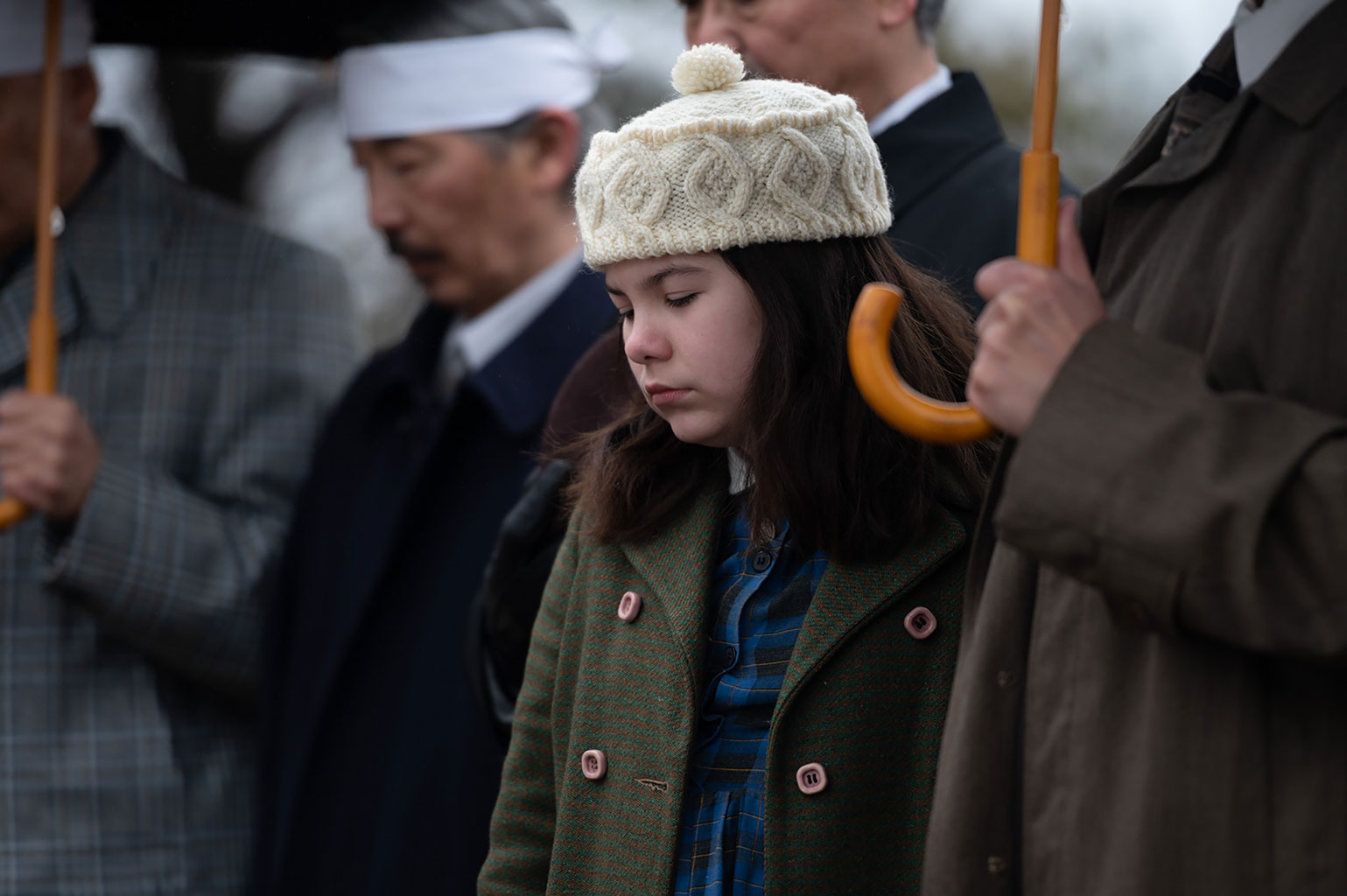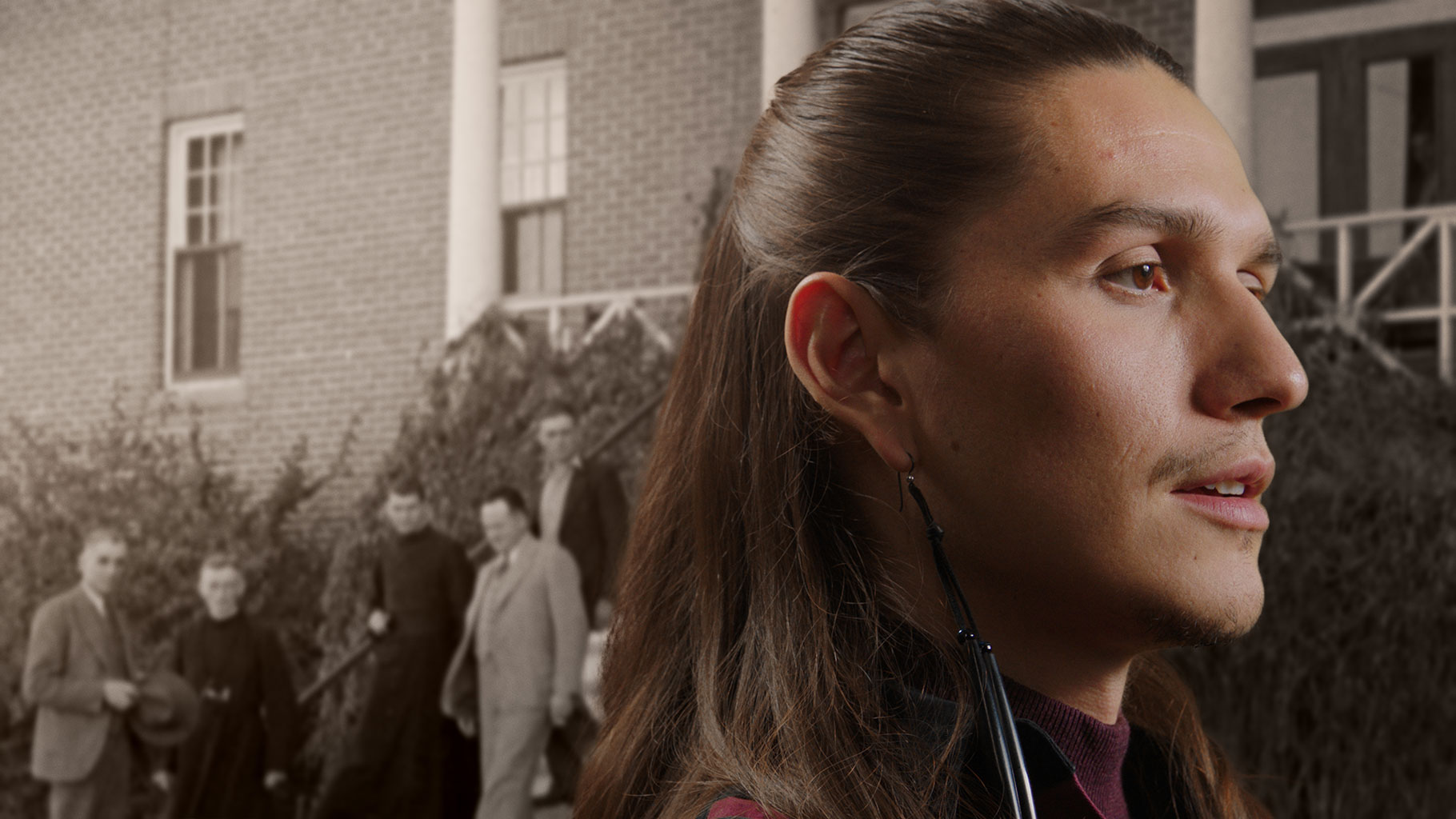
What’s notable about imagineNATIVE, held at TIFF Lightbox in Toronto, is their exceptional commitment to accessibility and care. Throughout the festival’s in-person events, every single film had captions, many events had sign language interpreters, all of their programming on the Friday of the festival was free, and cultural care workers were available for those who needed to speak to a mental health professional about challenging themes presented in the films.
imagineNATIVE will continue to stream virtually through October 29th, with a number of online-only special features. Below are some of the festival’s feature film highlights, including Café Daughter, Hey, Viktor!, Muru, WaaPaKe (Tomorrow).

Café Daughter
(Shelley Niro, 2023, Canada, 97 minutes, in English and Cree with English subtitles)
In the Canadian drama, Café Daughter, elements of creative sound design and magical realism are incorporated to tell the empowering story of a Chinese-Cree girl who is told to pretend she isn’t Indian her whole life — yet learns to reconnect to her Indigenous roots after her Cree mother passes. Based off of a Kenneth T. Williams stage play of the same name, the film takes inspiration from the life of Dr. Lillian Dyck, a former Canadian senator, neuroscientist, and advocate for Indigenous rights.
Café Daughter follows its main protagonist, Yvette Wong, through changing times. Through the eyes of young Yvette, played by Violah Beauvais, and teenage Yvette, played by Star Slade, viewers witness the changing dynamics of Canada’s relationship to both Chinese immigrants and Indigenous people in the 1950s and 1960s. The isolation felt by both groups within dominant settler society is presented on-screen through indicators such as alcoholism and loss of cultural identity for both the Chinese and the Cree. Yet while their struggles are similar in some ways, Café Daughter shows their differences through the way society treats them.
Café Daughter could have been one of tragedy; instead, it is an empowering work of art that shows a determined young Asian-Indigenous woman achieving her dreams. At the center of it all is Yvette’s unwavering desire to become a doctor, despite society’s discouragement.
Hey, Viktor!
(Cody Lightning, 2023, Canada, 102 minutes, in English)
An unapologetically Indigenous-humored mockumentary by Cody Lightning (Cree) — one of the child stars of Smoke Signals (1998) — Hey, Viktor! hinges its entire plot on the fact that Lightning was once a child star and might’ve hit his peak when in 1998.
Throughout Hey, Viktor, Lightning’s goal is to make a sequel of Smoke Signals, even though he has no money. But luck strikes when the shady German who just purchased the local pawn shop promises to supply him funds. The catch? He must get the original cast of Smoke Signals on board for the sequel. Lighting agrees — except he actually doesn’t have a meaningful relationship with any of the old cast members.
With creative multi-cam humor, a high degree of arguably unnecessary male nudity, and cameos from Smoke Signals stars galore, Hey, Viktor! is silly in premise and satisfying in execution. Among its stars may or may not be Adam Beach — but those remembering Beach’s unbelievably luscious locks in Smoke Signals will be delighted by one of Hey Viktor‘s funniest main characters: Adam Beach’s wig.
Muru
(Tearepa Kahi, 2022, New Zealand, 104 minutes, in Tūhoe with English subtitles)
A Maōri action-drama film presented in the Tūhoe language, Muru describes itself as “not a recreation… [but] a response” to multiple incursions by the New Zealand police into their community over the decades. Specifically, it cites: one incident in 1916, where Māori leader and prophet Rua Kēnana was arrested and his family members killed; a police shooting of Steven Wallace in 2000 which caused larger clashes; and 2007 anti-terror raids on Tūhoe.
Filmed in the lands of Te Urewera and Rūātoki, Muru weaves together threads from actual historical events to create a hypothetical narrative that is less tragic for the Maōri people. In addition to highlighting the complex relationship dynamics of small town communities where everyone knows everyone — including the police and government moles — Muru also stars an influential activist, Tame Iti, who plays himself and was highly influential in shaping the film. Tame Iti was arrested in real life during the 2007 raids, under New Zealand’s Terrorism Suppression Act and the Firearms Act. In the film, he is also marked as a terrorist and is the main target of the New Zealand government.
Muru is the first film to receive funding through Te Tumu Whakaata Taonga, a New Zealand Film Commission fund intended to develop feature films in te reo Māori, or the Māori language. It successfully shows how colonizing forces often don’t understand Indigenous customs, humor, or worldviews, and thus render them dangerous and worthy targets for their violence. Though the film doesn’t explicitly call out any connections with any other Indigenous struggles, Muru nonetheless is reminiscent of such incursions all over the globe, past and present.

WaaPaKe (Tomorrow)
(Jules Arita Koostachin, 2023, Canada, 80 minutes, in English and Cree with English subtitles)
WaaPaKe, which translates as “Tomorrow” in the Cree language, is a bold work of personal filmmaking that examines the intergenerational harms wrought by Canada’s history of residential schools. Writer-director Jules Arita Koostachin (Attawapiskat First Nations) combines intimate, highly stylized talking head interviews with 3D-rendered effects; the effects, which offer sparkle despite the heavy subject matter, weave throughout the film and represent the magical, playful spirit of the thousands of children who perished at residential schools, whose bodies continue to be unearthed from unmarked graves.
WaaPaKe takes remarkable care and imbues every aspect of its process with intention. At the start of the film, Koostachin can be heard saying that each day of the production will follow Indigenous protocol and include blessings. In a Q&A following the film’s screening at imagineNATIVE, Koostachin shared that the film’s production designer, Yolonda Skelton, worked closely with each film subject to choose a number of objects of significance to them which would surround them during the interview process. The hope was to be able to create a comfortable atmosphere for film subjects to share their potentially traumatic or difficult histories.
Viewers also catch behind-the-scenes glimpses of the greenscreen backdrop against which each interview is filmed. Throughout WaaPaKe, the greenscreen is keyed out and replaced with footage that serves to create a mood or heighten the testimony of a film subject. It might, at times, feature a natural landscape such as waves paired with bird sounds, or it might show historical footage or imagery of significance.
Koostachin uses WaaPaKe as an opportunity to speak of her relatives, including her grandparents, who never went to boarding school and thus retained a lot of their Cree language and traditional ways of life. Other interview subjects included Koostachin’s mother — a residential school survivor who experienced many challenges, including trauma, abuse, and a lack of love — as well as her son, who found himself “angry” at the ways in which residential schools disconnected him from traditional practices.
Koostachin describes herself as a “child of a [residential school] survivor,” and this thread is explored thoroughly throughout WaaPaKe, both through Koostachin’s own testimony and those of her similarly-aged peers. Other notable threads are those of suicidal ideation and the loss of language is notable; multiple interview cannot introduce themselves in their Indigenous languages because residential schools severed their connections.
WaaPaKe‘s creative presentation goes a long way in creating a dynamic, immersive experience. Because the film was co-produced with the National Film Board of Canada, Koostachin had an extensive amount of time to deeply consider every image that went into the film. She also had access to the NFB’s archives, which contain some of the earliest documentation of Indigenous peoples in Canada. Many of those make their way into the backdrop of the film, adding rich historical and cultural layers to WaaPaKe, in subtle and striking ways.
Ω






